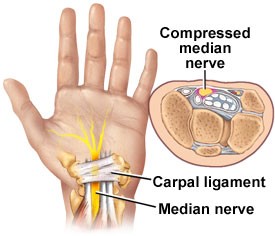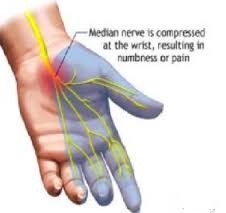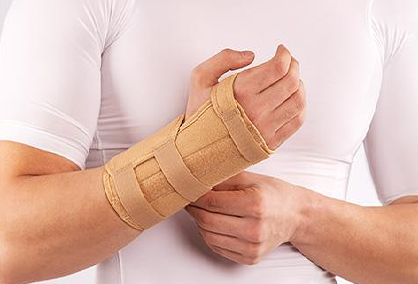Fingers Numbness
Wrist and hand numbness & tingling

Carpal tunnel syndrome is one of important cause of numbing in the wrist and hand. In general, carpal tunnel syndrome develops when the tissues around the median nerve of the hand swell and press on the nerve.

What are causes of CTS?
In most cases, it isn't known why the median nerve becomes compressed. However, some things do increase the risk of CTS. This includes:
- Family history of CTS
- Pregnancy – up to about 50% of pregnant women develop CTS
- Injuries to the wrist
- Hand and wrist position extreme flexion or extension of the hand and wrist for a prolonged period of time can increase pressure on the nerve.
- Obesity- Being overweight is a consistent risk factor for CTS
- Repetitive hand use- Workers who use their hands and wrists repetitively are at risk for CTS, particularly if they work in cold temperatures. some jobs Such as Computer Users, Typists and Musicians are at risk of CTS.
- Diabetes
- Aarthritis rheumatoid
- Sex and age- Studies show that women and older people are more likely to develop the condition.
What are symptoms of CTS?
Symptoms usually progress gradually over weeks and months, or sometimes years

- Wrist and hand pain
- Numbness, tingling and burning sensation particularly in the thumb and index, middle, and ring fingers. These sensations usually develop gradually and being worse during the night.
- Weakness of the hand- this may make it difficult to perform fine movements such as buttoning your clothes.
- Night-time symptoms: Because many people sleep with their wrists bent, symptoms may awaken you from sleep. (During the day, symptoms often occur when holding something for a prolonged period of time with the wrist extreme flexion or extension, such as when using a phone, driving, or reading a book).
How is CTS treated?
- Wrist splint or wrist & thumb splint. Wearing a brace or splint at night will keep you from bending your wrist while you sleep. Keeping your wrist in a straight or neutral position reduces pressure on the nerve in the carpal tunnel.


- Nonsteroidal anti-inflammatory drugs (NSAIDs)
- Activity changes. Symptoms often occur when your hand and wrist are in the same position for long time—particularly when your wrist is flexed or extended.
- Steroid injections. A cortisone injection may also be used by your doctor to help diagnose your carpal tunnel syndrome.
- Surgical Treatment. If nonsurgical treatment does not relieve your symptoms after a period of time, your doctor may recommend surgery. The sooner you start treatment, the better your chances of stopping symptoms and preventing long-term damage to the nerve.
- Some points for carpal tunnel relief in home or work:
- Take breaks from repetitive tasks: Whether you’re typing or playing guitar, try setting a time break. Stop what you’re doing and stretch your hands and move your wrists to improve blood flow to these areas.
- Wear splints on your wrists: Keeping your wrists straight can help relieve the pressure on your median nerve. Symptoms are more common at night, so wearing a splint may help relieve your symptoms.
- Keep your wrist neutral: Avoid activities that make your wrists flex to the extreme in either direction. If you doing repetitive tasks at work, you can also wear wrist splints during the day.
- Stay warm: Keeping your hands warm can help with pain and stiffness.
- Exercise: elevate hands and wrist whenever possible

Anyone with recurrent or persistent pain, numbness and tingling, or weakness of the hand should consult a doctor for an evaluation
Your comment successfully stored, thanks. Unfortunately comment storage process failed.